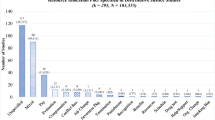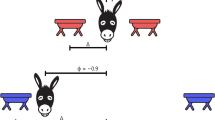Abstract
Participants who were more inclined to consider ambiguous work elements as inputs (input-oriented or Type-I persons) or as outcomes (outcome-oriented or Type-O persons) were presented with situations in which they had delivered a higher or lower work performance than another person. They were asked to take money for themselves, give money to the other person, and divide a fixed sum of money between themselves and the other as reward for the performances. The specific combination of (input or outcome) orientation of the participant and the type of transfer (giving, taking, or dividing) determined the reward the participant allocated to him- or herself and/or to the other person. Type-I persons showed an egocentric bias in their allocation behavior, whereas Type-O persons allocated according to a maximin strategy.
Similar content being viewed by others
References
Adams, J. S. (1963). Toward an understanding of inequity. J. Abnorm. Soc. Psychol. 67: 422–436.
Adams, J. S. (1965). Inequity in social exchange. In Berkowitz, L. (ed.), Advances in Experimental Social Psychology Vol. 2. New York: Academic Press, pp. 267–299.
Aderson, N. H. (1976). Equity judgments as information integration. J. Person. Soc. Psychol. 33: 291–299.
De Dreu, C. K.W. (1996). Gain–loss frame in outcome-interdependence: Does it influence equality or equity considerations? Eur. J. Soc. Psychol. 26: 315–324.
Fossum, J. A. (1979). The effects of positively and negatively contingent rewards and individual differences on performance, satisfaction, and expectations. Acad. Manag. J. 22: 577–589.
Heider, F. (1958). The Psychology of Interpersonal Relations. New York: Wiley.
Kuhlman, D. M., and Marshello, A. (1975). Individual differences in the game motives of own, relative and joint gain. J. Res. Person. 9: 240–251.
Lane, I. M., and Messé, L. A. (1971). Equity and the distribution of rewards. J. Person. Soc. Psychol. 20: 1–17.
Leventhal, G. S. (1976). The distribution of rewards and resources in groups and organizations. In Berkowitz, L., and Walster, E. (eds.), Advances in Experimental Social Psychology Vol. 9. New York: Academic Press, pp. 91–131.
Leventhal, G. S., and Whiteside, H. D. (1973). Equity and the use of reward to elicit high performance. J. Person. Soc. Psychol. 25: 75–83.
McClintock, C. G., Messick, D. M., Kuhlman, D. M., and Campos, F. T. (1973). Motivational bases of choice in three-choice decomposed games. J. Exp. Soc. Psychol. 9: 572–590.
Messick, D. M., and McClintock, C. G. (1968). Motivational bases of choice in experimental games. J. Exp. Soc. Psychol. 4: 1–25.
Messick, D. M., and Sentis, K. P. (1979). Fairness and preference. J. Exp. Soc. Psychol. 15: 418–434.
Messick, D. M., and Sentis, K. (1983). Fairness, preference, and fairness bias. In Messick, D. M., and Cook, K. S. (eds.), Equity Theory: Psychological and Sociological Perspectives. New York: Praeger, pp. 61–94.
Mikula, G. (1980). On the role of justice in allocation decisions. In Mikula, G. (ed.), Justice in Social Interaction: Experimental and Theoretical Contributions from Psychological Research. Bern: Hans Huber Verlag, pp. 127–166.
Schulz, U., and May, T. (1989). The recording of social orientations with ranking and pair comparison procedures. Eur. J. Soc. Psychol. 19: 41–59.
Schwinger, T. (1980). Just allocations of goods: Decisions among three principles. In Mikula, G. (ed.), Justice in Social Interaction: Experimental and Theoretical Contributions from Psychological Research. Bern: Hans Huber Verlag, pp. 95–125.
Shapiro, E. G. (1975). Effect of expectations of future interaction on reward allocations in dyads: Equity or equality. J. Person. Soc. Psychol. 31: 873–880.
Syroit, J. E. M. M. (1984). Interpersonal Injustice: A Psychological Analysis Illustrated with Empirical Research. Tilburg: Tilburg University, Doctoral dissertation.
Tornow, W. W. (1971). The development and application of an input–outcome moderator test on the perception and reduction of inequity. Organiz. Behav. Human Perform. 6: 614–638.
Van Avermaet, E. (1974). Equity: A Theoretical and Experimental Analysis. Unpublished doctoral dissertation, University of California, Santa Barbara.
Van Avermaet, E., McClintock, C. G., and Moskowitz, J. (1978). Alternative approaches to equity: Dissonance reduction, pro-social motivation and strategic accommodation. Eur. J. Soc. Psychol. 8: 419–437.
Von Grumbkow, J. (1980). Sociale Vergelijking van Salarissen [Social Comparison of Wages]. Tilburg: Tilburg University, Doctoral dissertation.
Von Grumbkow, J., and Syroit, J. (1975). Input–Outcome Georiënteerdheid in Relatie tot de Waarneming van Onbillijkheid en de Prestatie [Input–Outcome Orientedness in Relation to Perceived Inequity and Performance]. Tilburg: Tilburg University, Unpublished manuscript.
Von Grumbkow, J., and Syroit, J. (1976). Bijdragen–Opbrengsten Vragenlijst: Studie 2 [Input–Outcome Questionnaire: Study 2]. Tilburg: Tilburg University, Unpublished manuscript.
Walster, E., Berscheid, G. W., and Walster, G. W. (1973). New directions in equity research. J. Person. Soc. Psychol. 25: 151–176.
Weick, K. E. (1966). The concept of equity in the perception of pay. J. Abnorm. Soc. Psychol. 68: 533–539.
Author information
Authors and Affiliations
Rights and permissions
About this article
Cite this article
Syroit, J., Poppe, M. Equity: Effects of Input and Outcome Orientation on Taking, Giving, and Dividing Money. Social Justice Research 13, 41–54 (2000). https://doi.org/10.1023/A:1007575819035
Issue Date:
DOI: https://doi.org/10.1023/A:1007575819035




